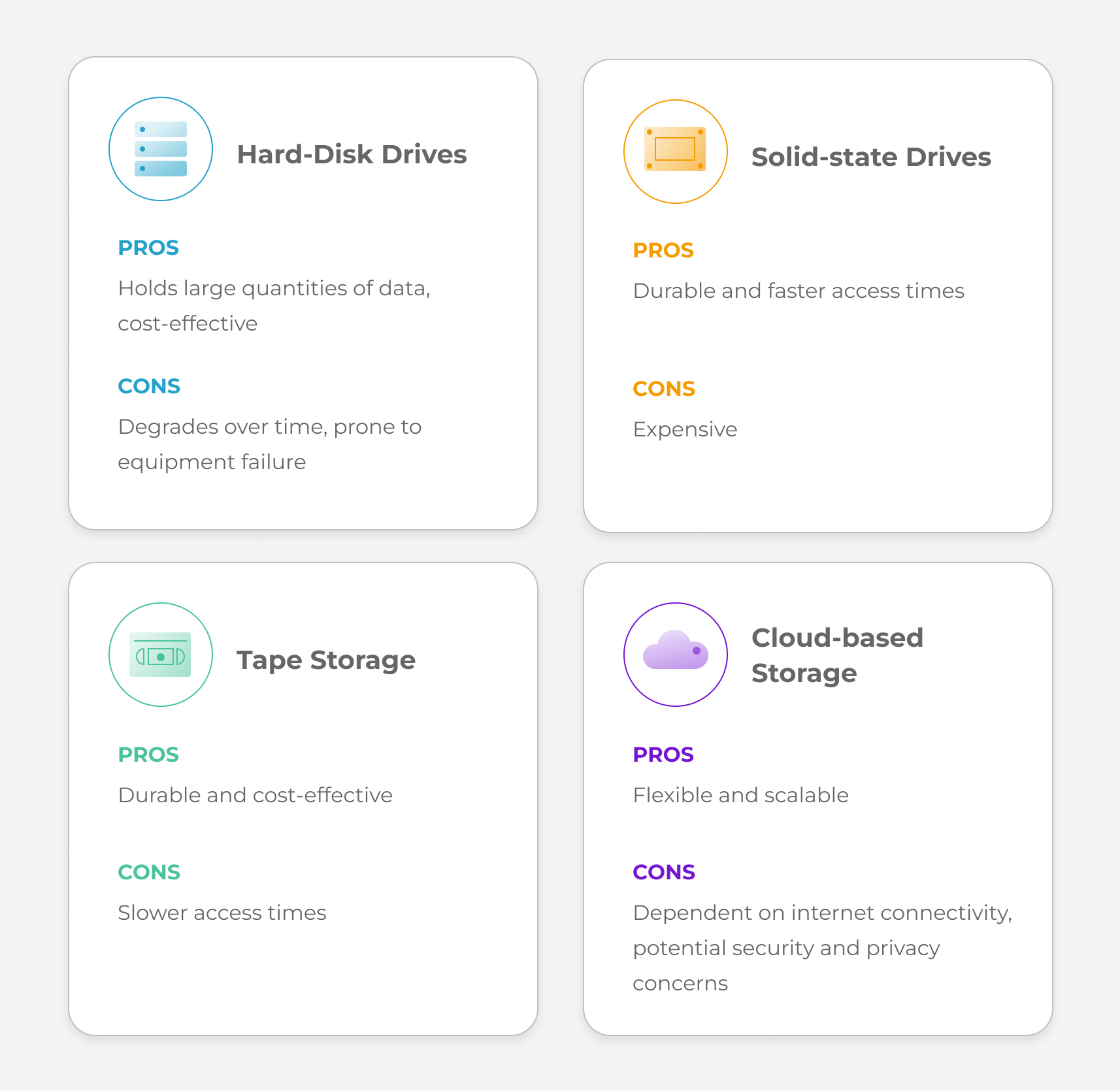What Is Immutable Storage? [+ 5 Reasons Why You Need It]
![What Is Immutable Storage? [+ 5 Reasons Why You Need It]](https://www.intradyn.com/wp-content/uploads/2023/12/Immutable-Storage_-What-It-Is-Why-You-Need-It.jpg)
In the world of data management, where concerns about data loss, data security and regulatory compliance loom large, immutable storage is the key to protecting your organization’s most important information from accidental deletions or malicious tampering. This article will explore not only the practical benefits of immutable backup but also what it is, how it works and why your organization needs it.
What Is Immutable Storage?
Benjamin Franklin is often attributed with saying that nothing in this world is certain, except for death and taxes — and now, we can add immutable storage to that list.
Immutable storage — also known as immutable backup — refers to a form of data storage where once information is written or saved, it cannot be modified, overwritten or deleted. By using immutable storage, organizations can create a tamper-proof record of business-critical data, from financial records, legal documents and intellectual property to compliance documents, historical records and customer data. This approach to storage and backup ensures data integrity and supports both cybersecurity and regulatory compliance.
In some cases, immutability can be set for a specific period of time, after which point data can be edited or deleted.
How Does Immutable Storage Work?
At a high level, immutable storage systems are configured to use a write once, read many (WORM) format. What this means is that data can only be saved or stored one time, after which point it becomes inalterable (“write once”). Although system users can access that data as many times as they want, they cannot overwrite it (“read many”).
At a more granular level, immutable backups may use the following technologies to achieve WORM-compliance:
- Data Hashing: When data is initially written, the immutable storage system uses an algorithm to generate a unique identifier known as a “hash” based on its contents. This hash is essentially a digital fingerprint that renders the data unchangeable and enables organizations to trace any attempted modifications.
- Timestamps: In addition to generating unique hashes, immutable storage systems will also assign timestamps to data whenever it is created or stored, enabling organizations to track the chronological order of data entries.
- Cryptographic Signature: Depending on the system, immutable backup may also use cryptographic signatures to further secure data. These are digital signatures verifying that the data has not been tampered with. If someone were to try to alter the data, it would render the signature invalid.
- Decentralization: Some immutable storage systems store copies of data across multiple locations or nodes. This decentralization enhances security by preventing there from being a single point of failure or manipulation. Decentralized storage may also include consensus mechanisms to ensure that all copies of that data include the same content and have the same timestamp.
- Access Controls: Most immutable backup systems include customizable access controls to restrict who can write, modify or access data.
Common Forms of Immutable Storage Media
Immutable storage can take many forms and use many different types of storage media, including:
- Hard-disk Drives: These are traditional storage devices that use spinning magnetic disks. Though hard drives are a cost-effective form of immutable storage media and can hold large quantities of data, they also degrade over time and are prone to equipment failure.
- Solid-state Storage Drives: Solid-state storage drives (SSDs) use flash memory to store data. Though SSDs are typically more expensive than hard-disk drives (HDDs), they make up for this by being more durable and allowing for faster access times.
- Tape Storage: Similar to HDDs, tape storage uses magnetism to store data — in this case, magnetic tape as opposed to magnetic disks. Tape storage is a popular form of immutable storage media for archival purposes due to its affordability and durability, though it does have slower access times than either HDDs or SDDs.
- Cloud-based Storage: Cloud-based storage relies on remote servers accessible through the internet. Cloud storage is made immutable through the use of encryption, version control and access management, all of which ensure the integrity of information stored across a distributed cloud infrastructure. Although cloud storage is highly flexible and scalable, it is dependent on internet connectivity and presents potential security and privacy concerns.
5 Benefits to Using Immutable Storage
Immutable storage and backup have become essential to organizations across all industries because they:
1. Prevent data from being altered or tampered with. Data integrity is essential, not only because it helps business leaders make informed decisions based on accurate information, but also because it’s required for eDiscovery and compliance purposes. By creating an inalterable record of business operations, immutable storage guarantees the integrity and authenticity of data.
2. Support compliance efforts. Speaking of compliance, many laws and regulatory frameworks — especially those in industries such as finance, healthcare, government and legal services — require organizations to preserve sensitive information and ensure its authenticity. Since immutable storage prevents data from being altered, overwritten or deleted, it offers organizations a reliable means of adhering to data retention, audit trail and other compliance-related mandates.
3. Preserve records for legal holds. Any organization subject to pending litigation is required to place a legal hold on any electronic records relevant to that lawsuit. As part of this legal hold, an organization must verify that those records are accurate and authentic, and that they’ve been preserved in their original format. Immutable storage guarantees data integrity for this exact purpose, which upholds the credibility of legal proceedings and enables businesses to avoid the potentially severe repercussions of submitting falsified evidence, such as financial penalties and legal sanctions.
4. Prevent data loss due to equipment failure or human error. Data loss prevention should be a priority for organizations for the sake of both data security and business continuity. Immutable backups support data loss prevention by ensuring that data, once written, cannot be modified or deleted — accidentally or otherwise — creating a reliable, tamper-proof record. In the event of equipment failure or other unforeseen issues, immutable backups make it easy to restore data.
5. Safeguard data against outside threats. Did you know that the global average cost of a data breach in 2023 was $4.45 million? That’s a 15% increase compared to 2020, showing that the risk — and cost — of data breaches continues to grow.
Immutable storage can mitigate this cost by preventing hackers from altering critical information, maintaining the integrity of the data. Many immutable storage and backup systems also use encryption to secure data and include access controls to restrict who can access, modify or delete data.
Why Your Organization Needs Immutable Storage
The business case for immutable storage and backup is clear. From safeguarding sensitive company and customer information to ensuring data integrity for regulatory compliance and litigation, immutable storage should be an essential component of any organization’s data management strategy, supplementing and strengthening traditional data storage.
While immutable storage is a “nice to have” for many organizations, in some industries it’s non-negotiable. Let’s take a closer look at some of the industries that require immutable storage and backup.
Law Enforcement
Immutable storage is crucial for law enforcement agencies to maintain the integrity and authenticity of evidence and records. Accurate evidence is essential to legal proceedings, and any tampering could compromise an entire case. Immutable storage ensures that, once captured and stored, evidence such as body camera footage or digital records remain unaltered and admissible in court.
Government
Government agencies handle vast quantities of sensitive and confidential data, from citizen records to national security information. Immutable storage is necessary to protect the integrity of this data and ensure its reliability for decision-making and regulatory compliance. By implementing immutable storage solutions, local and federal government agencies can secure their data against unauthorized modifications or tampering. Not only does this support compliance efforts and meet stringent data integrity requirements, it also helps government entities maintain public trust.
Healthcare
In the healthcare industry, where patient confidentiality and data accuracy are paramount, immutable storage is critical. Electronic health records and medical data must be preserved in an unalterable state to ensure patient safety, regulatory compliance and the reliability of medical information.
Immutable storage and backup prevents unauthorized changes to patient records, protecting against fraud and ensuring that healthcare providers make decisions based on accurate and unmanipulated data. This is crucial for maintaining the quality of patient care, complying with privacy regulations such as the Health Information Portability and Accountability Act and building trust between healthcare providers and their patients.
Financial Services
Financial institutions have a duty to ensure the accuracy and security of financial records and customer information, which makes immutable storage a must-have. By creating an inalterable record of all financial data, banks, credit unions and other financial institutions can ensure compliance with regulatory standards such as the Sarbanes-Oxley Act and the Security and Exchange Commission Rule 17a-4. Immutable storage also prevents fraud by maintaining the integrity of audit trails, upholding the trust of clients and regulatory authorities.
Education
As educational institutions increasingly rely on digital platforms for administrative processes, immutable storage is indispensable to ensuring the integrity of academic records and student data. By keeping an accurate account of all education records, including grades, transcripts, class lists and course schedules, immutable storage and backup help primary, secondary and higher education institutions comply with privacy laws, such as the Family Educational Rights and Privacy Act, and maintain accreditation.
Protect Your Essential Data with Intradyn
Searching for a secure, scalable and tamper-proof way to store your organization’s electronic communications? Look no further: Intradyn’s all-in-one archiving solution offers a trustworthy way for organizations in all industries and of all sizes to store business-critical communications and essential company, customer and employee data without the risk of modification or accidental deletion. From custom access controls and retention policies to automatic capture and data encryption, our platform creates a reliable record of even your most sensitive data.
See Intradyn’s immutable storage and backup capabilities for yourself in our on-demand demo, or schedule a consultation with a member of our sales team today.


